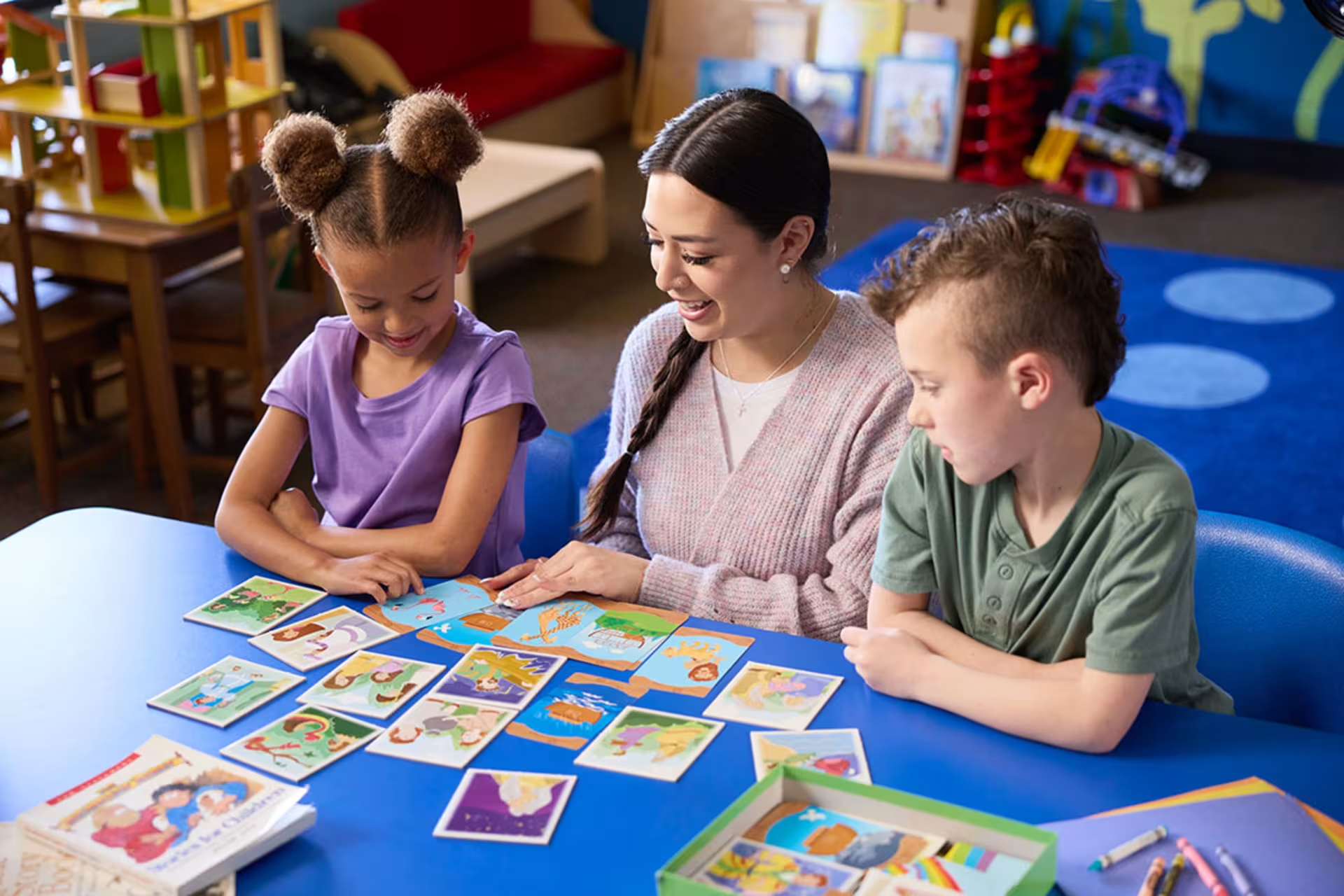
Master’s in Early Childhood Education Degree (Non-Licensure)
Shaping the Future of Young Learners
Explore the academic and development needs of children from birth to eight years old in the Master of Education (MEd) in Early Childhood Education (non-licensure) program. During the early childhood years, the role of an early childhood educator can have a major impact on a child’s life. When children are nurtured with a positive, supportive environment and the right academic guidance, they are better able to meet developmental targets and develop skills they will need throughout their lives.(See disclaimer 1)
Offered by the College of Education at Grand Canyon University, this MEd in Early Childhood Education (ECE) can provide an in-depth review of literacy intervention, typical and atypical child development and instructional methodologies across disciplines. You will examine concepts that can inspire and enrich your teaching practices in early learning environments.

Up to 12 credits or 1/3 of the total program requirements in transfer (whichever is less)
Credits: Fill out the Lopes Eval to find out what will transfer
Admission Requirements (Master's)
- Undergraduate Degree*
- 2.8+ GPA
OR 2.5+ Unweighted GPA and
- GMAT: 500
- GRE: 300 combined**
Admission requirements may differ based on degree level, program and modality, or transfer status. Some programs of study may require a higher GPA and/or other qualifying criteria for admission. Please review full admission and program requirements in the University Policy Handbook.
* Degree must be from an accredited college or program that has been approved by GCU.
** Combined verbal/quantitative, after August 2011 (1,000 combined verbal and quantitative, prior to August 2011).
Pursue Your MEd in Early Childhood Education From GCU
The early years in a child’s life are critical for brain development and children in nurturing, development-focused environments tend to exhibit better future outcomes in learning, behavior and health.(See disclaimer 1,2) As an aspiring early childhood educator, you can make a difference in the lives of children within your community by empowering them with the support they need.
Immersive Curriculum
Earn an Early Childhood Education Master’s Degree Online
Licensure vs. Non-Licensure
A teacher’s license or certification is not a requirement to enroll in this master’s degree program. However, this MEd does not lead to initial teacher licensure, making it an appropriate program choice for students who already have their teaching license or for professionals who are looking to fulfill state or department requirements for their particular role within education. For those looking to earn their initial teaching license, our MEd in Early Childhood Education licensure program may be a better option. This degree program teaches important skills for early childhood educators, ranging from instructional planning to classroom management to learning environment optimization.

What To Expect in Early Childhood Education Courses
With an emphasis on evidence-based methodologies and the use of data analysis for instructional decision-making, your coursework will consist of hands-on learning opportunities.
In this early childhood education master’s program, you will explore a comprehensive range of content areas such as:
Instruction methods for exceptional learners and non-English speakers
Classroom engagement and management techniques
Developmental milestones and methods of evaluation
Curriculum development for language arts, math, science, health, social studies and the arts
Patterns of learning across the cognitive, linguistic, physical, social and emotional areas
Cultural awareness and competencies, with a look at support for various family types
Curriculum and Skills in the Master’s in ECE Program
The Master’s in Early Childhood Education program offers a research-based curriculum designed to deepen your understanding of child development and early interventions for children from birth through third grade. Under the guidance of knowledgeable faculty, you’ll refine your instructional methods through evidence-based strategies and hands-on learning experiences.
Throughout the program, you’ll engage in fieldwork across diverse classroom settings, gaining practical experience with children of varying developmental stages and abilities. These immersive opportunities support your exploration of activity planning and assessment techniques.
In addition to foundational knowledge, the program can equip you with a broad set of educational skills essential for effective teaching and learning, including:
By combining academic rigor with practical application, this program prepares you to become a thoughtful, skilled educator capable of making an impact in early childhood education.
Career Paths for MEd in Early Childhood Education Graduates
As an early childhood education professional, you may hold the power to sculpt the potential of upcoming generations, offering them the guidance and resources for their flourishing.
Pursue work across a variety of settings, including:(See disclaimer 4)
Daycare centers
Early childhood education centers
Preschools
Elementary schools
Median annual wage for kindergarten and elementary school teachers in May 2024(See disclaimer 5)
Number of College of Education online educational academic programs, emphases and certificates (as of June 2024)
AAQEP-Accredited Master of Education Degrees
GCU prioritizes the quality of our education and has been institutionally accredited by the Higher Learning Commission (HLC) since 1968. GCU is a member of the Association for Advancing Quality in Educator Preparation (AAQEP), a national accrediting organization recognized by the Council for Higher Education Accreditation. As an institutionally accredited university, our instructors are knowledgeable in their fields and committed to supporting our students. Visit GCU’s education accreditation page to view our programs that have been awarded full accreditation by AAQEP.
Frequently Asked Questions
It’s natural to have some questions as you reflect upon your intended career path and degree program options. The following frequently asked questions and answers may address any concerns you may have.
Is a master's in early childhood education worth it?
What can you do with a master's in early childhood special education?
Can you be an elementary teacher with an early childhood education degree?
How hard is an early childhood education degree?
Program Curriculum
Core Courses

Take your teaching to the next level by strengthening your skills and expanding your impact in education. Fill out the form on this page to learn more about GCU’s early childhood education master’s degree online.
If you are seeking licensure/certification, please refer to the "Accreditation and Compliance/State Disclosures” link for the specific program of interest’s website for your location and/or employment state’s licensure requirements, per 34 CFR 668.14(b)32 and 668.43(c).
- Centers for Disease Control and Prevention. (2023, Feb. 24). Early Brain Development and Health. Retrieved May 2024.
- Centers for Disease Control and Prevention. (2017, July 28). CDC Grand Rounds: Addressing Health Disparities in Early Childhood. Retrieved October 2023.
Excluding observational and practice-based experiences and student teaching.
- Learn.org. (n.d.). Master’s in Early Childhood Education: Salary and Career Facts. Retrieved October 2023.
- The earnings referenced were reported by the U.S. Bureau of Labor Statistics (BLS), Kindergarten and Elementary School Teachers, as of May 2024, retrieved August 2025. Due to COVID-19, data from 2020 to 2023 may be atypical compared to prior years. BLS calculates the median using salaries of workers nationwide with varying levels of education and experience. It does not reflect the earnings of GCU graduates as kindergarten and elementary school teachers, nor does it reflect the earnings of workers in one city or region of the country or a typical entry-level salary. Median income is the statistical midpoint for the range of salaries in a specific occupation. It represents what you would earn if you were paid more money than half the workers in an occupation, and less than half the workers in an occupation. It may give you a basis to estimate what you might earn at some point if you enter this career. Grand Canyon University can make no guarantees on individual graduates’ salaries. Your employability will be determined by numerous factors over which GCU has no control, such as the employer the graduate chooses to apply to, the graduate’s experience level, individual characteristics, skills, etc. against a pool of candidates.
- Teach.com. (n.d.). Master of Arts in Teaching vs. Master in Education. Retrieved October 2023.
- Indeed. (2023, Aug. 16). Early Childhood Educator Skills: Definition and Examples. Retrieved October 2023.
- PraxisExam.org. (n.d.). The Best Teaching Strategies for Early Childhood Educators. Retrieved October 2023.


